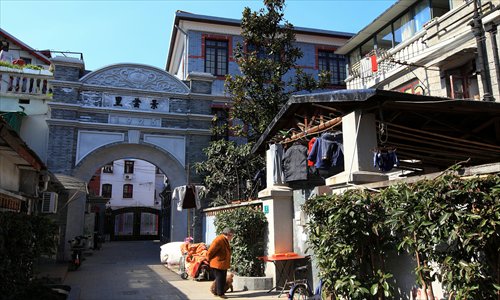
Jingyunli was once home to the country's literary trailblazers.
A safe retreat
Because Duolun Road was on the boundaries of the International Settlement and under the de facto Japanese military occupation between 1932 and 1945, it was considered a comparatively safe place for left-wing writers to live and work and avoid the Kuomintang government's persecution.
Guo Moruo, one of the country's literary trailblazers, moved to 110 Darroch Road (now No.89, Lane 201 Duolun Road) in November 1927. This is where he gave the final touches to a translation of Faust which was published in February 1928. Guo did not remain for long on Duolun Road - he left for Japan the same month.
Right on the back of Lane 125 Duolun Road is Lane 35 Hengbang Road, or "Jingyunli," where three rows of three-story shikumen (traditional Shanghai-style houses with stone gates) were built in 1924. Ye Shengtao, who started his literary career inspired by the New Culture Movement in 1919 and became a prominent writer and publisher, was among the earliest tenants.
During his stay at 11 Jingyunli between May 1927 and the spring of 1932, Ye completed and serialized his novel Ni Huanzhi (1928) in the Chinese Educational Review. First published in August 1929 and reprinted in 13 editions from 1930 to 1949, the tale of an intellectual who was disillusioned after the New Culture Movement yet found renewed hope in revolution upon death, is one of Ye's most widely-acclaimed works. He was also the editor in chief of the literary magazine Fiction Monthly, through which he introduced the works of progressive young writers including Ding Ling and Ba Jin, both of whom made their socialist convictions clear in their writings and achieved widespread popularity.
In August 1927, 11 Jingyunli saw the arrival of the then obscure Mao Dun, who flourished later to become one of the greatest modern Chinese novelists, and, after 1949, the country's minister of culture. Mao Dun spent four weeks in an apartment in the shikumen writing his debut novella Disillusion, which was serialized in the Fiction Monthly later that year.
It was also at Jingyunli that Mao wrote Vacillation (1927) and Pursuit (1928). The three novellas, focusing on young revolutionaries' devotion, despair, and doubt in the ups and downs of revolution during the years between 1923 and 1927, form his Eclipse trilogy.

Copyright ©1999-2011 Chinanews.com. All rights reserved.
Reproduction in whole or in part without permission is prohibited.